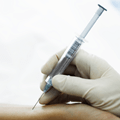Rapid Decision-Making in Emergencies: The Role of immunoassay and Blood Gas and Urea/Crea Testing
December 10, 2025
Radiometer Saudi is pleased to invite you to an insightful and educational webinar focused on presenting the role of rapid diagnostic testing in emergency care, highlighting how integrated immunoassay, blood gas, and urea/creatinine testing improve clinical decision speed and diagnostic confidence in critical cases.






